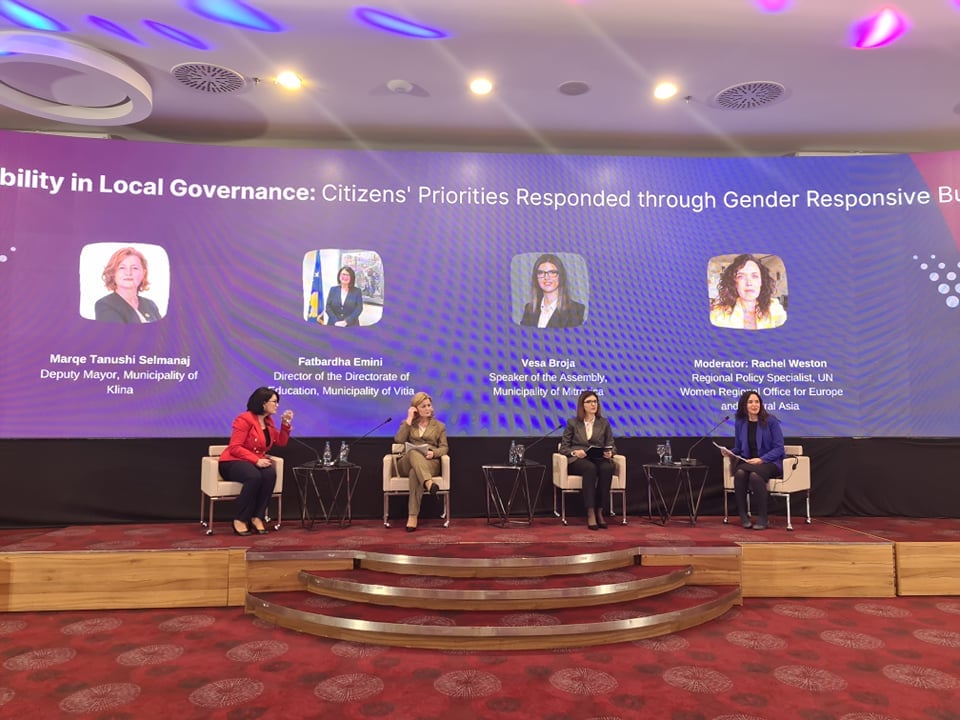Budgeting for equality on the agenda at high-level ‘Week of Women’ panel
Date:

The challenges of making budgets respond equally to the needs of women and men were debated at a panel, supported by UN Women in Kosovo* and organized by the National Democratic Institute (NDI) on 16 March. Under the title “Accountability in Local Governance: Citizens' Priorities Addressed through Gender Responsive Budgets,” the panel brought together high-level representatives from local governments.
The panel discussion raised a number of issues and concluded that building the capacities of local government staff was key if the country was going to fulfil the legal requirements of gender budgeting. The panel was moderated by Rachel Weston, the UN Women Regional Policy Specialist for Europe and Central Asia. Meanwhile, the panelists included: Marqe Selmanaj, the Deputy Mayor of the Municipality of Klina; Vesa Broja, the Head of the Assembly of the Municipality of Mitrovica; and Fatbardha Emini, the Head of the Education Directorate at the Municipalty of Vitia.
Gender responsive budgeting is a way of closing the gap between opportunities provided for women, men, girls and boys, Weston said during the panel discussion. There was a “need for all elected officials to vastly increase investments in gender equality to close gender gaps and to ensure that no one is left behind,” she said.
“The conference ‘Week of Women’ is an important platform for policy debate about gender equality with leading stakeholders on the issue. This year, in partnership with NDI, we brought together a great panel that discussed gender responsive budgeting at the local level as a way to improve the lives of men and women,” said Vlora Tuzi Nushi, Head of Office for UN Women, Kosovo.
“Budgeting equally is very important to respond to the specific and different needs of citizens,” said Marqe Selmanaj, adding that the Municipality of Klina lacks the capacities to conduct the needed gender analysis.
Meanwhile, Vesa Broja said that in the Municipality of Mitrovica, due to the changes in governance after the 2021 local elections, they have not managed to conduct a gender analysis of budget expenditures yet. However, she emphasized that they hope that next year a gender analysis would be conducted and they would be able to plan the budget and specify the differentiated needs of women and men.
According to Fatbardha Emini, the Municipality of Vitia, managed to financially support women-led businesses and generate new jobs using the gender responsive budgeting analysis. “We have subsidized 13 women entrepreneurs who managed to further employ 20–25 other women and export their products. The subsidy process was partly covered by donors, and it is very important to have their support in this regard,” said Emini.
The panelists agreed that increased participation in public discussions is key when it comes to budgeting responsively and for meeting the needs of all citizens. They also concluded that gender analysis in different sectors is essential if the goal is to decrease inequalities between women and men.
From 2020, Kosovo is part of the regional programme “Transformative Financing for Gender Equality towards more Transparent, Inclusive and Accountable Governance in the Western Balkans”. This programme, financially supported by the Swedish International Development Cooperation Agency (Sida), is expected to take gender responsive budgeting to the next level in Kosovo. It will focus on building the capacities of local experts, gender equality officers, policy planners, as well as public finance managers and analysts, the Kosovo Assembly and municipalities, also civil society organizations from various sectors. At the same time, the programme will support stakeholders to develop a regulatory framework for gender responsive budgeting in Kosovo.
* All references to Kosovo should be understood to be in the context of United Nations Security Council resolution 1244 (1999).